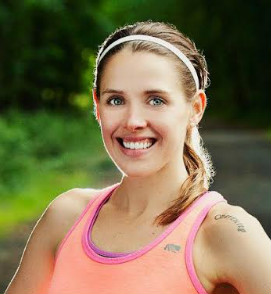Exercise Is Not My Identity
In college, I found comfort in something I could control. I found comfort in something that allowed me to get on a higher platform in running. I dropped my time by four seconds in one year and for the 800 meters, that was a lot. I was on the record-breaking DMR team that went to nationals. I was working out with the best women. On the outside, I was the “perfect” athlete. I was overly-committed and working out all the time. I gained momentum from all the comments on how “good” or “lean” I looked. I was definitely in denial and I hid it well to those on the outside. On the inside, I was dying. I was losing the battle that was so hard to fight and I was doing it alone.
The transition from college to professional life wasn’t easy. I continually battled my eating disorder, but kept it a secret. The more stress that came into my life, the more my eating disorder thrived. Running was a part of the equation after college, but I knew I wasn’t running well because my body was suffering. I forced myself to run and I hated it. I was trapped.
I moved for my first full-time job in 2012. I ended up getting injured in the spring of 2013 as I was still unhealthy, but it was at that time when I met my husband. I wasn’t fully in recovery from my eating disorder until I got married. I had an accountability partner who loved me unconditionally, the first time ever. The more I talked about my eating disorder, the more alive I felt. I think that eating disorders thrive in secrecy. For so long, I kept my story a secret and I had feelings of regret and fear of what people would think of me.
The balance that I found with exercising took some time. It was partially because my eating disorder and running were co-dependent. But also, because my sole identity seemed to be found in my sport. I hadn’t explored other things that I was passionate about. I needed to re-define the “why.” To go back to the beginning of why I started running. I needed to spend time finding the joy that I once had through running.
I want to encourage anyone to find your passions outside of exercising. I’ve found other things that bring passion: cooking, traveling, cycling, and singing. Being active can be a piece of who you are, but it shouldn’t be everything.
Jennifer Rollin, MSW, LCSW-C suggests three ways to begin to develop a sense of identity outside of your eating disorder:
1. Explore passions and hobbies that have nothing to do with food or attempting to change your body.
2. Take steps to strengthen your relationships and make new social connections.
3. Explore your values.
The exercise is to imagine that you are in your 80s and looking back on your life and then to answer the following questions:
I wish I would have spent less time…
I wish I would have spent more time…
If I could go back and do something differently, I would…
Ed’s note: For more information and tips, check out NEDA’s Coach & Trainers Toolkit.





